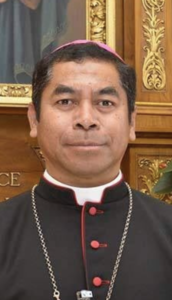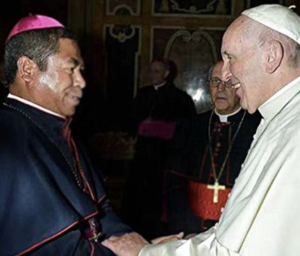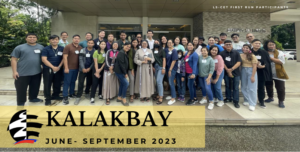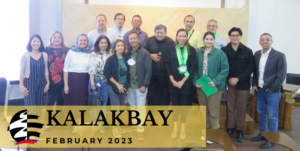 Archbishop Virgilio Da Silva was only 7 years old when he stopped going to school because of the civil war in East Timor. After 4 years living a nomad’s life, his family returned to their hometown, and in 1979 he enrolled himself to resume his elementary studies in the sub–district of Venilale. In Grade Six, he wanted to continue his studies, and upon graduation, he transferred to Don Bosco in Fatumaca which is 13 kilometers away from his home town. He approached the principal of that Salesian school in order to get himself enrolled. However, the Salesian in charge informed him that it was not an ordinary school but a seminary. For Virgilio, the only reason he wanted to study there was because it was a newly opened junior high school in the area. He did not know that it was a seminary.
Archbishop Virgilio Da Silva was only 7 years old when he stopped going to school because of the civil war in East Timor. After 4 years living a nomad’s life, his family returned to their hometown, and in 1979 he enrolled himself to resume his elementary studies in the sub–district of Venilale. In Grade Six, he wanted to continue his studies, and upon graduation, he transferred to Don Bosco in Fatumaca which is 13 kilometers away from his home town. He approached the principal of that Salesian school in order to get himself enrolled. However, the Salesian in charge informed him that it was not an ordinary school but a seminary. For Virgilio, the only reason he wanted to study there was because it was a newly opened junior high school in the area. He did not know that it was a seminary.
His nine years in the primary and secondary school in Fatumaca became the cradle of his Salesian spirit as well as his priestly vocation. He was blessed to be nurtured in the Salesian spirituality by many great Salesian missionaries. Because of these experiences, he decided to follow their example because he saw them work tirelessly for the good of the Timorese people, especially the young and the poor. He said to himself, “Should I not dare to follow the example of these missionaries by offering myself to my fellow Timorese?” That thought pushed him to pursue his dream to become a Salesian of Don Bosco. On the 30th of May 1990 he made his first profession.
Abp. Da Silva belonged to the second group of Timorese that arrived in Don Bosco Seminary-College in Canlubang-Laguna. He had very little knowledge of English. Moreover, leaving behind East Timor for Manila was not easy for him back then because of the unstable political situation happening in his country. One of the most painful experiences he had was when he could not contact his parents and friends back home. But due to the fatherliness of Fr Alton Fernandez, the rector of the Seminary and the assistant and professor of philosophy beloved Fr. Michael La Guardia (+), he never felt alone or indifferent to the other seminarians. He learned a lot of good things and truly experienced the joy of living, studying and working together as a brother and as a son of Don Bosco.
One of his most unforgettable experiences was manual work as part of formation. It required time to sacrifice from their study and rest but, once they did it with love and for the good of the community, blessings came pouring down. So, besides studying philosophy with his classmates, he was assigned to work in the piggery by taking care of the pigs and preparing their food. Another life-changing experience was when he encountered men and women affected by the eruption of Mt. Pinatubo and the subsequent lahar-flow.
Abp. Da Silva also had a lot of cherished memories in his four years in Don Bosco School of Theology in Paranaque. He considers prayer life, study of theology and apostolic immersion very important. These remain the three pillars that sustain and stimulate him in his thirty-three years as a Salesian of Don Bosco — twenty-four years, a priest, and seven years, a bishop.
The formative steps leading to receiving the ministries of Lector and of Acolyte, and making the perpetual profession, and becoming ordained deacon and finally, as a priest were very important moments for him and his batchmates. Abp. Da Silva mused that he particularly admired the patience and wisdom of Fr. Francis Gustilo and the team of formators who spent time sharing, listening to the stories of the seminarians, and accompanying them in making right decisions each step of the way until they fully committed themselves to God.
The Seminaryo ng Don Bosco slowly accommodated clerics from South Korea, Japan, Thailand, Myanmar, Indonesia and Timor Leste and this made it to be a regional seminary. It was a community rich in diversities and yet united in one spirit, that of Don Bosco. For Abp. Da Silva, his membership in a small cluster made him and each confrere feel involved and actively participate in the various activities of seminary-life.
He also expressed his deep and sincere gratitude to all his superiors as well as professors in the Seminaryo ng Don Bosco Paranaque, among whom are Abp. Francesco Panfilo, Bp. Broderick Pabillo, Fr. Francis Gustilo, Fr. Rene Lagaya, Fr. John Cabrido, Fr. Greg Bicomong, and Fr. Monchit Garcia. Their friendship, dedication and wisdom led him to place his entire life to God on his priestly ordination, the 8th of December 1998.
After eight years serving as a novice master and seven years as the rector of Colegio Don Bosco Fatumaca, his three years as bishop and three years as Archbishop of the Archdiocese of Dili gradually brought him to understand better the general situation of the people of God, especially the demands of the local Church. Since his first day as a bishop, he envisioned to work for the consolidation of the faith of the Timorese Catholics. He focused on the formation of the clergy and the faithful.
years as Archbishop of the Archdiocese of Dili gradually brought him to understand better the general situation of the people of God, especially the demands of the local Church. Since his first day as a bishop, he envisioned to work for the consolidation of the faith of the Timorese Catholics. He focused on the formation of the clergy and the faithful.






